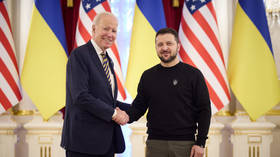EU member needs Moscow to keep its metro running

The European Union is set to grant Hungary an exemption in its latest package of sanctions against Russia that would allow Budapest to keep its metro running, Bloomberg reported on Thursday.
Line 3 of the capital city’s underground uses trains that were made by Metrovagonmash, a Russian subway train maker sanctioned by the US.
The exemption will permit imports of goods and services needed to maintain the trains, as well as buy new subway and tramway coaches, according to documents seen by Bloomberg. Among the parts reportedly covered by the derogations are safety glass, specific types of machinery and some valves, telephone sets, signaling mechanisms such as bells and indicator panels, and related technical assistance. In total, Hungary will be allowed to import goods falling under some 14 tariff codes, the outlet says.
On Wednesday, EU member states passed the 11th package of Ukraine-related sanctions on Moscow, which is mainly aimed at stopping third countries and companies from bypassing the existing trade restrictions.
Line 3 is the longest of the four metro lines in Budapest, spanning 17 kilometers and 20 stations. It was opened in 1976 and the rolling stock is still comprised of the Soviet-built metro cars. The line underwent reconstruction in recent years and a number of carriages were refurbished.
In February, the Hungarian media reported that EU sanctions against Moscow made much needed repairs and maintenance of the ageing fleet of Russian-made trains impossible, as the restrictions prohibited the purchase of some components from Russian suppliers.
Hungarian Prime Minister Viktor Orban has been a vocal critic of EU restrictions against Russia and has maintained economic ties with the sanctioned nation. He has managed to extract concessions from the EU on several occasions, including the right to continue buying Russian oil and gas.
For more stories on economy & finance visit RT's business section













